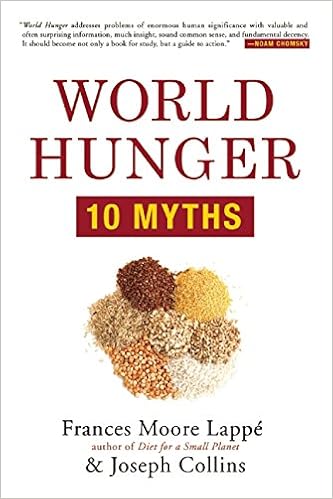This is a review of the 2015 version of the book World Hunger: Ten Myths.
World Hunger was first published in 1977. Its relevance, nearly 40 years and many iterations later, is testament to its place in the canon of food systems literature. Chapter by chapter, Frances Moore Lappé and her co-authors demolish the myths that have long prevented us from addressing hunger, and examine the policies that keep people from feeding themselves. The arguments, revised and updated as they are, are just as valid today.
At its core, World Hunger is not a book about food, or the absence of food. It is a book about politics. The premise of the book is this: How we think about hunger impedes our actions towards ending it. Indeed, some of the most compelling arguments made in the book outline how actions that were supposedly designed to help—international aid, or the Green Revolution, to name just two—have actually exacerbated the problem.
Hunger, counter to agri-business fear mongering, isn't about the scarcity of grain or land. In fact—and Lappé lists several examples to underscore her point—many of the countries in which hunger is rampant are net exporters of food. By the authors' definition, hunger is a "scarcity of democracy." It is wrought by political, social, and economic inequality. Hunger, then, will exist for as long as people continue to be made powerless—not just in the international arena, but even at the national level, in the village, or within the household.

Nor is hunger about overpopulation. Nowhere in the research, they write, can they find a direct correlation between population density and hunger. Hunger is driven by inequality and poverty; the rest is politics. And that 9 billion by 2050 we keep reading about? According to the research Lappé presents, the population will stabilize thereafter, and will remain well within the planet's carrying capacity.
Hunger cannot be blamed on climate change or natural disasters, either. Floods, famines, and droughts have always been weathered by resilience. What makes people more vulnerable to these events? The short answer: disruptions to their resilience. Again, Lappé offers examples spanning continents and centuries—time and again, from Ireland to Bangladesh to Ethiopia, the root of the problem is socially constructed. The real killers, World Hunger reveals, are monoculture, hoarding, conflict, and debt.
It is heartening that World Hunger dismisses the widely held notion that attempting to feed the world's hungry will destroy the environment. Lappé makes a convincing case for agro-ecology as the solution. Her claim that environmentally sustainable agriculture can be more productive than our current industrial system—or indeed, genetically modified organisms (GMOs)—is backed by very encouraging numbers.
Perhaps the most insightful and profoundly disturbing chapters are the ones devoted to the myths that the free market can end hunger. In actuality, Lappé writes, the market is blind to externalities, it responds only to money, and it leads to concentration of power. For all these reasons, it directly contributes to the causes of hunger. World Hunger thus reveals one of the very tenets of neoliberalization to be founded on a falsehood. The authors do outline ways that the market and government can work together to end hunger, but add that this won't happen as long as buying power remains in the hands of a limited few.
Several of the arguments made in World Hunger would have been astonishing when they were first made decades ago; some will be surprising to many still. Globalization and free trade, like the free market, is revealed to be far from the panacea that it was touted to be. World Hunger outlines, in excruciating detail, the disastrous impact that structural adjustment, imposed by the International Monetary Fund (IMF) and the World Bank, had on the welfare of the people and environment in developing countries. Trade agreements like North American Free Trade Agreemen (NAFTA), and more recently, the Trans-Pacific Partnership (TTP) and Transatlantic Trade and Investment Partnership (TTIP), Lappé argues, are a race to the bottom; a search for the lowest wages, the most lenient regulations, and the least protected resources. What that inevitably translates to is hunger in the countries providing them.
Ultimately, the book's strength is in the clarity of its message. World Hunger is concise, straightforward, hard-hitting. A book this easy to read won't be lost in the mire of policy wonks or academia. But it is also no blunt instrument. Lappé and her co-authors don't just bust long-standing myths and preempt counter-arguments with an armory of research, they build enough nuance into their narrative to provoke you into questioning your own personal beliefs about hunger. And then they tell you what you can do about it. When it comes down to it, that is where its power lies: World Hunger is a manifesto for change, and its call to action has never been more urgent. After all, if hunger is human-made, it is also reversible.




